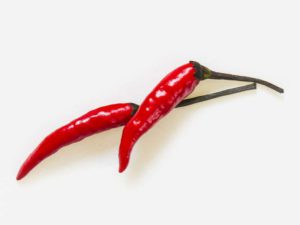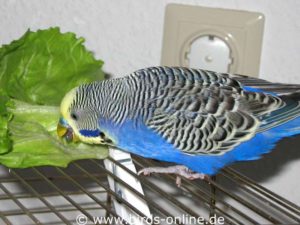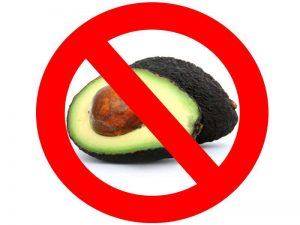- >>
- Birds Online – English
- >>
- Health and diseases
- >>
- General health topics
- >>
- What you can do...
- >>
- Healthy fresh food
Healthy fresh food
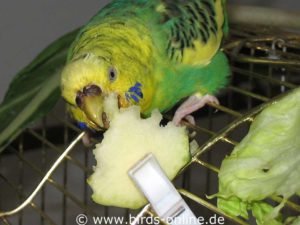
Many pet birds are true gourmets who love a diverse diet. Unfortunately, not all bird owners know which fresh food is digestible for their feathered friends. Therefore, you will find some basic information on this topic in this article.
The following information should give you a quick introduction to the topic. The lists of suitable vegetables, fruits, and herbs should help you to make the daily diet of your birds as varied as possible – not only in case they’re ill. A healthy and varied diet is good for every bird.
Healthy vegetables
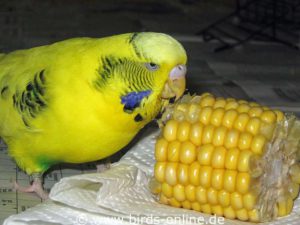
If you have not yet studied this topic in more detail, you will be surprised about how many sorts of vegetables you can offer to your birds. Some of the list items are marked with small superscript numbers. These refer to important notes further below.
- Beetroot or beet
- Black salsify (whole plant)
- Broccoli or Chinese kale1
- Brussels sprouts (sliced)1
- Cabbage turnips2
- Carrot
- Cauliflower3
- Celery stalks
- Chard
- Chicory
- Chillies4
- Chinese cabbage or celery cabbage1
- Corn, fresh
- Cucumber
- Curly kale or borecole1
- Eggplant
- Endive5
- Fennel
- Garden radish
- Garlic6
- Iceberg lettuce5
- Jalapeño peppers4
- Jerusalem artichoke or sunchoke
- Knob celery or celery root
- Lamb’s lettuce5
- Leaf salad or lettuce5
- Leek or garden leek6
- Onion6
- Pak choi or bok choy7
- Parsley root
- Parsnip
- Potato (cooked without salt)
- Pumpkin
- Purslane
- Radish
- Rocket or roquette
- Rutabaga or swede
- Snow pea
- Spinach
- Spring onion or green onion6
- Sweet pepper or bell pepper
- Sweet potato (cooked)
- Tomato
- Turnip greens
- Zucchini or courgette
Explanations regarding some vegetables
1. The different sorts of cabbage can cause winds and intestinal troubles in birds. For this reason, only very tender leaves and no leaf veins should be served. Furthermore, cabbage should be on the birds’ menu only occasionally and in small quantities.
2. Although the rumor persists that cabbage turnips are heavily digestible for the animals, one can serve this vegetable heedlessly to budgies or other pet birds.
3. Feel free to offer your birds cauliflower from time to time. Budgies and some other birds love to eat the tiny florets. You can serve them raw. But these vegetables are even more easily digestible if they have been cooked (without salt!) for a short time. However, these vegetables should not be served too often, see above.
4. Unlike us, birds do not have a sense of taste for hot food items. Therefore, you can offer them chilies or chili peppers without concern.
5. Many people advise against feeding birds on leaf salad or other sorts of salad, as this fresh food is said to cause diarrhea in the animals. This is a popular misconception and you can offer your birds salad as long as it is not polluted with pesticides. But where does the assumption come from that salad may cause diarrhea in birds? Because lettuce and other leafy vegetables are mainly water-based, birds consume comparatively large amounts of liquid when eating. This water leaves the bird’s body with the droppings or occasionally as a drop of urine that does not contain solid feces at all. But be reassured: Not everything that leaves the posterior body orifice of the birds very liquid is genuine diarrhea. After the consumption of leaf salad or other fresh food that contains a lot of water, the birds excrete urine only temporarily in larger quantities. At the latest one to two hours after eating green salad, the urine portion of the droppings of budgies should have normalized again.
6. Some literature sources state that onions, spring onions, leeks, and garlic are harmful to birds. They claim that some substances contained in these vegetables can cause red blood cells to burst, leading to anemia. However, other sources indicate that these foods are harmless to birds when served in small quantities. I have served small amounts to my birds on several occasions, and so far there have never been any health issues afterward. But what is a small portion? Regarding my budgies and Lineolated parakeets, this means that each animal takes only a few bites of this fresh food at maximum once per week.
7. In Asia, especially in Thailand, a cabbage variety botanically related to Chinese cabbage is known as Pak Choi. In contrast to Chinese cabbage, this member of the cabbage family is a leaf-stalk vegetable whose appearance is remotely reminiscent of chard.
Please never feed your birds on avocado. It is very high in fat which might lead to overweight in birds. But what is even more important: Parts of the avocado are toxic for birds. Fresh beans are unsuitable as food for birds as well. They can cause severe digestive problems. Asparagus and edible mushrooms should also not be served to birds.
Healthy fruits
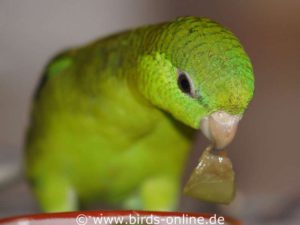
Fruit plays an important role in the daily diet of birds – at least in some species. Many popular pet birds should receive a daily portion of fresh fruit, among them Lineolated parakeets. On the other hand, for example for budgies, vegetables are much more important than fruits since they’re often rapidly getting overweight by too much sweet fresh food. Nevertheless, serving them fruits can be healthy for the birds, as long as the quantity and frequency are not excessive. Below you find a list of suitable fruits. Some of the list items are marked with small superscript numbers. These refer to important notes further below.
- Acai berry
- Apple
- Apricot
- Banana (some birds do not like it because it is so sticky)
- Blood Orange8
- Blueberry
- Bramble
- Cherimoya
- Cherry
- Clementine8
- Crab apple
- Currant (red, black and white)
- Custard apple (Sweetsop)
- Dates (dried)9
- Dragon fruit (Pitahiya)
- Elderberry
- Fig (fresh or dried)9
- Gooseberry
- Grape
- Greengage plum
- Guava
- Honey pomelo8
- Indian fig
- Japanese Plum (Loquat)
- Jostaberry
- Kiwi
- Lychee
- Mango
- Melon10
- Mirabelle
- Mulberry11
- Nashi (Asian pear)
- Nectarine
- Orange8
- Papaya
- Peach
- Pear
- Persimmon (Kaki)12
- Pineapple
- Plum
- Pomegranate
- Prickly pear
- Quince
- Rambutan
- Raspberry
- Star fruit
- Strawberry
- Tamarillo (Tree tomato)
- Tangerine8
Explanations regarding some fruits
8. Citrus fruits contain a lot of fruit acid. It can irritate the mucosa of the digestive system in sensitive birds. If one of your pet birds shows discomfort after eating citrus fruits, you should not offer it again in the future. In general, oranges and the like should only be served in small quantities in order not to risk any digestive problems.
9. You should try to get unsugared dried dates or figs for your birds. Do not serve these fruits too often. Dried dates and figs are real fatteners due to their high natural sugar content.
10. Each kind of melon is highly appreciated by budgies and many other pet birds. From watermelon or musk melon to honeydew melon – they’re all healthy treats for the animals.
11. Good to know: Budgies and several other pet birds do not only like the berries, but also the leaves of mulberry trees.
12. Persimmon or kaki should only be served when the fruits are ripe and sweet. As long as they are still unripe, these fruits contain too many tanning agents and are therefore usually not well tolerated by birds.
Healthy herbs
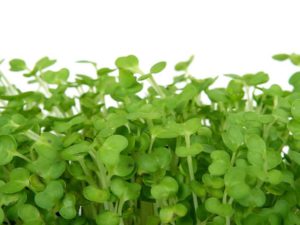
Not only we humans enjoy adding herbs to our food. They are also a real treat for birds. Both kitchen herbs and wild herbs can be used. The plants should not have been treated with pesticides. Ideally suited, for example, are kitchen herbs from organic cultivation – or those you have grown yourself in the garden, on the balcony, or the windowsill.
The list below shows you which herbs you may offer to your feathered friends. Some of the list items are marked with small superscript numbers. These refer to important notes further below.
- Basil13
- Borage
- Burnet
- Carrot tops
- Chervil
- Chive
- Coriander leaves
- Cress
- Dill
- Fennel tops
- Lemon balm
- Lovage
- Majoram
- Melissa
- Mint13
- Mugwort
- Oregano13
- Parsley14
- Purslane
- Rocket (roquette)
- Rosemary13
- Sage13
- Sorrel
- Savory
- Tarragon
- Thyme13
- Watercress
- Wild garlic (wood garlic)
Explanations regarding some herbs
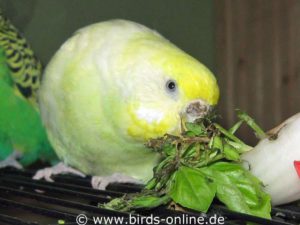
13. In most cases, birds first have to get used to the aromatic taste of these herbs. But once they’re familiar with their taste, budgies and other birds love to eat them. Nevertheless, please offer these herbs only in small quantities. They are rich in essential oils, which in higher doses could irritate the mucosa of the bird’s digestive system.
14. Again and again, somebody claims that parsley is toxic for birds. These plants contain toxic substances like apinol and myristicin. However, these two substances make up only a small part of the total contents. To make it clear: For a bird to be poisoned by parsley, the animal would have to eat enormous quantities of these herbs at a time. Bird owners who only occasionally offer small amounts of parsley do not endanger their feathered friends in general. So the dose makes the poison.

